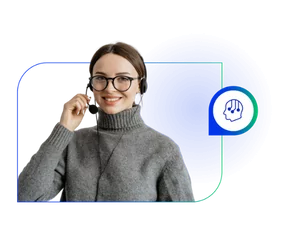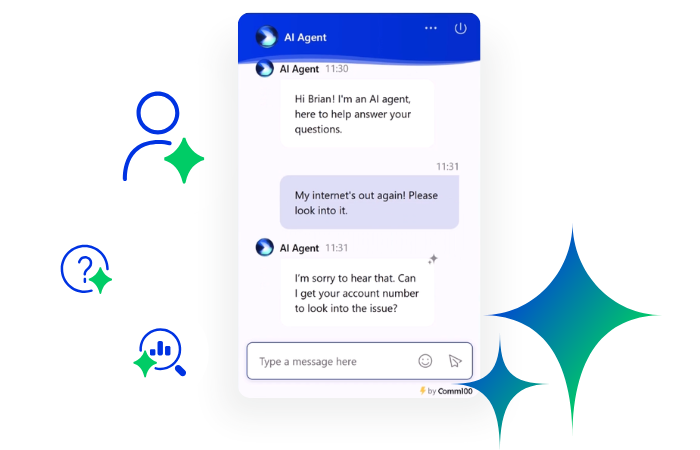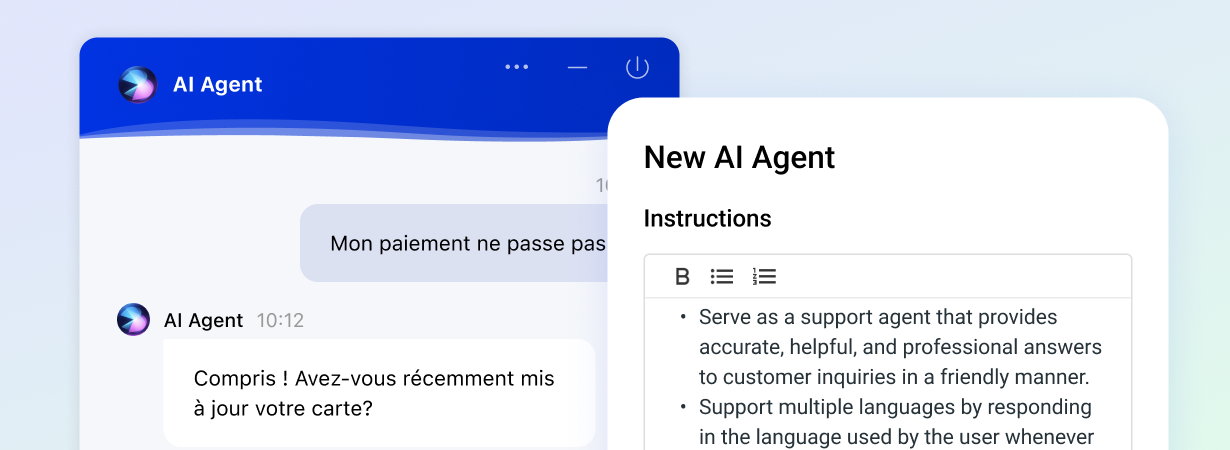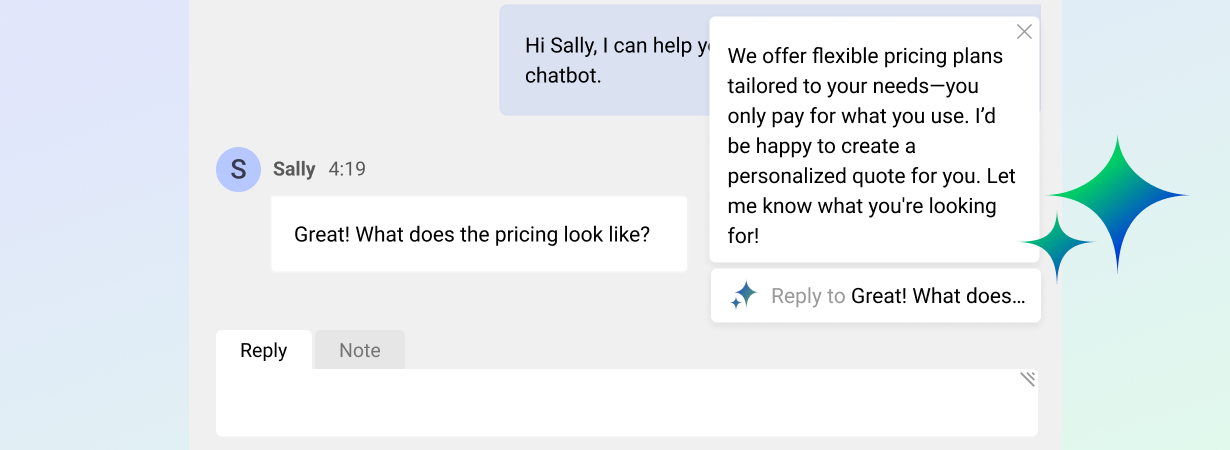What if every student had a personal assistant, ready to answer questions, offer guidance, and simplify their academic journey—all without ever taking a break? AI chatbots are making this a reality, revolutionizing how students interact with their schools.
Gone are the days of waiting in line or navigating complex systems to find help. Higher ed chatbots are reshaping the student experience, offering real-time support, streamlining processes, and opening doors to a more connected and engaging approach to education.
Higher Ed Chatbots vs. Conventional Chatbots: What’s the Difference?
While conventional chatbots are designed to assist with general customer service inquiries, a higher ed chatbot is tailored to meet the unique needs of educational environments.
Note: The Comm100 chatbot is now the Comm100 AI Agent. It leverages natural language processing (NLP) and generative answers to offer more personalized and tailored responses.
These specialized AI agents go beyond resolving basic questions — they are built to handle diverse and complex student interactions, from enrollment inquiries to personalized learning support. Here’s what sets them apart:
Contextual Awareness and Personalization
Higher ed chatbots can access and process student-specific data, enabling them to provide personalized answers.
For instance, they can guide students through their course registration process based on their program requirements or help them understand financial aid options specific to their eligibility.
Higher ed chatbots or AI agents can also integrate with institutional systems to access real-time student data, enabling them to deliver personalized responses tailored to an individual’s academic history, current enrollment status, or financial aid eligibility.
This depth of context ensures that students receive information that is accurate, relevant, and specific to their circumstances, enhancing their overall experience and engagement.
In contrast, generic chatbots operate on a more generic level, providing standard responses without the ability to draw on detailed user data.
While sufficient for basic customer service interactions, they lack the contextual awareness needed to address the multifaceted concerns of students.
Enhance student engagement and streamline processes with Comm100
Transform student support with Comm100’s AI chatbot. Deliver personalized, 24/7 assistance for admissions, registration, financial aid, and more.
Request a demo today
Request Demo
Purpose and Scope
Higher ed chatbots or AI agents are purpose-built to cater to the distinct needs of educational institutions and their students. These chatbots handle queries specific to academia, such as admissions processes, course registration, financial aid assistance, and academic advising.
They are designed to navigate the complexities of student interactions, offering tailored support that aligns with the unique workflows of higher education environments.
Conventional AI agents, on the other hand, are typically designed for broader customer service applications. Their primary function is to address general inquiries, like tracking orders, troubleshooting basic issues, or providing account information.
24/7 Availability for Global Audiences
Universities often cater to students across different time zones, making constant availability a necessity.
Higher ed chatbots ensure that students, especially international ones, can access support whenever they need it, whether for admissions queries or technical troubleshooting during online classes.
With over 32,000 undergraduate students and 5,000+ post-graduate students in Canada, McMaster University deployed Comm100’s higher ed chatbot in 2020 to address student queries, improving user experience and boosting CSAT scores to 4.82/5.
Maximize student support with Comm100
Learn how McMaster University maximized support capacity with the Comm100 chatbot.
Learn more
Customer Story
Integration with Campus Systems
Unlike conventional chatbots, which often operate as standalone tools, higher ed chatbots are integrated into various campus systems, including learning management systems (LMS), student information systems (SIS), and library databases.
This allows them to provide detailed assistance, like retrieving assignment deadlines or checking library book availability.
How Higher Ed Chatbots Help Improve Student Support
Higher education institutions face significant challenges in providing effective student advising due to limited advisor availability, inconsistent advising quality, and underutilized advising capacity.
AI-powered chatbots offer innovative solutions to streamline student support, addressing these pain points and enhancing the overall educational experience.
Alleviating Advisor Constraints
The advisor-to-student ratio in most institutions is imbalanced, leading to limited availability for personalized guidance.
AI agents can handle routine inquiries, allowing human advisors to focus on complex, personalized advising tasks. This integration enhances the overall advising experience for both students and advisors.
Scalability to Handle Greater Traffic During Peak Periods
One of the biggest benefits of using higher ed chatbots is that you don’t have to worry about adding more agents when demand jumps up at certain times during the year. The AI agent can easily address more queries without much of an issue.
For example, during admissions deadlines, a chatbot can answer frequently asked questions about required documents, application status, and next steps—all in real-time—while staff focus on more complex cases.
Moreover, this scalability extends to multilingual support, ensuring that students from diverse backgrounds can access help in their preferred language.
By efficiently handling high traffic, higher ed chatbots enable institutions to maintain exceptional service quality even during the busiest times of the academic year.
Dedicated chatbots for colleges and universities can go a long way in helping them automate manual and repetitive tasks and improve student engagement.
Enhancing Consistency and Quality of Advising
Variations in advising quality often stem from decentralized practices and inconsistent training across departments.
One of the main advantages of AI chatbots is that they provide standardized information, ensuring that all students receive accurate and consistent guidance. This uniformity helps in maintaining a high standard of advising services across the institution.
Higher ed chatbots or AI agents can be programmed to use inclusive language and support multiple languages, making advising more accessible to international students and those facing language barriers.
They provide a non-judgmental platform for discussing sensitive issues, fostering open communication and support for all students.
Reducing No-Shows and Optimizing Advisor Schedules
Missed appointments and last-minute cancellations pose a significant challenge for maintaining efficient advising schedules. These disruptions not only create unproductive gaps in advisors’ calendars but also prevent other students from utilizing those time slots.
In addition to reminders, Ai agents can facilitate seamless rescheduling for students who need to change their appointment times.
By providing real-time availability and flexible options, these systems reduce the administrative burden on staff while ensuring that unused time slots can be quickly reassigned to other students.
This capability minimizes downtime, optimizes the use of advisors’ time, and ensures that more students can access the support they need.
Maximize advisor efficiency with Comm100
Boost advisor efficiency and elevate student support with Comm100’s AI-powered solutions.
Try out Comm100
Request Demo
Addressing Challenges and Ethical Considerations
The use of specific chatbots or tools like ChatGPT in higher education offer a plethora of benefits, as we’ve already discussed. However, they also present a series of challenges and ethical considerations that must be addressed to ensure responsible and effective use.
Safeguarding Data Privacy and Ensuring Compliance
Higher ed chatbots often handle sensitive student information, including personal details, academic records, and financial data. Protecting this information is paramount to maintain trust and compliance with regulations such as the Family Educational Rights and Privacy Act (FERPA).
Because so much data is being processed through these chatbots, it’s imperative that organizations choose a solution that uses robust data encryption and complies with governance policies regarding unauthorized access and safe data handling.
At Comm100, we take platform security very seriously. Our higher ed chatbot has been rigorously tested and is in compliance with SOC 2 Type II, ISO 27001, HIPAA, PIPEDA, and GDPR standards.
Balancing Technology with Human Oversight
While AI chatbots can efficiently manage routine inquiries, over-reliance on them may lead to challenges in addressing complex or sensitive student needs. It’s crucial to maintain human oversight to handle nuanced situations that require empathy and critical thinking.
We like to call it human-bot harmony. Establishing clear protocols for escalating issues from chatbots to human advisors ensures that students receive appropriate support when needed.
As technology continues to evolve, the way institutions support and engage students must also advance. Higher ed chatbots offer a powerful solution to the challenges of advising, accessibility, and inclusivity, bridging gaps that traditional methods often leave behind.
From providing personalized, real-time guidance to enhancing the efficiency of advisors and ensuring consistent support, these AI-driven tools are shaping the future of education.
But the question remains: as we embrace these innovations, how can institutions balance the convenience of AI with the human connection that defines a truly transformative educational experience?
The answer lies in leveraging chatbots not just as tools but as partners in creating a support system that empowers every student to thrive. Are you ready to take the next step in redefining student engagement? Request a demo of the Comm100 chatbot today.








